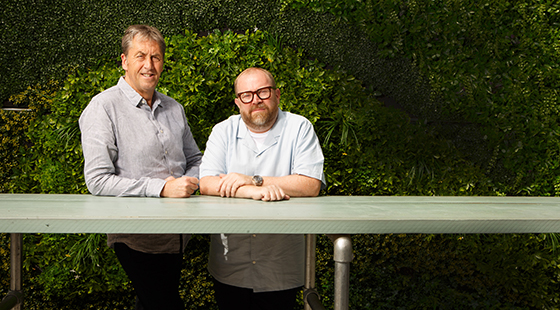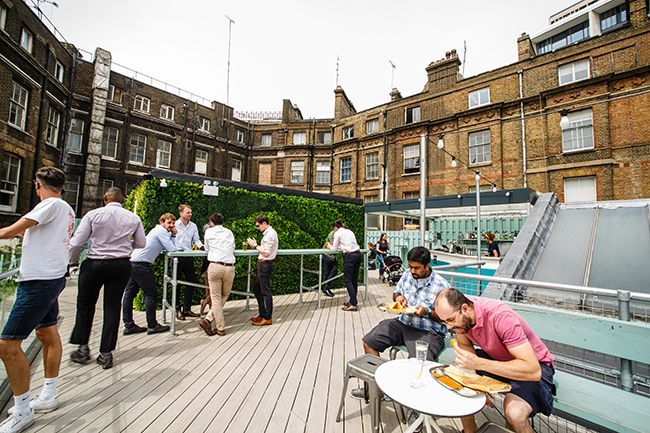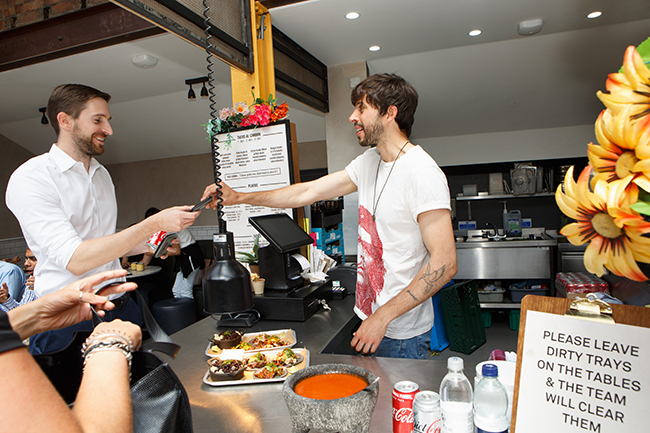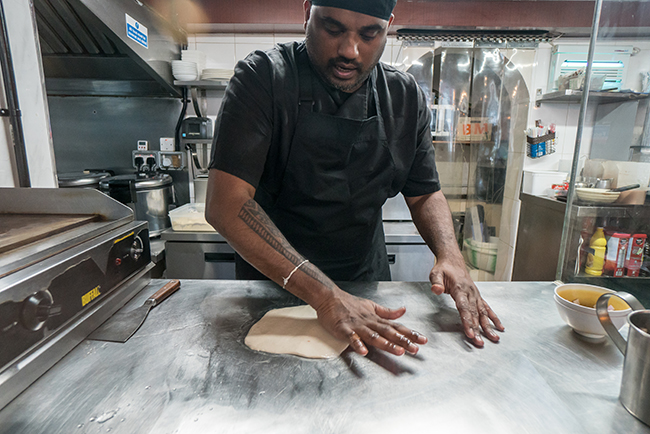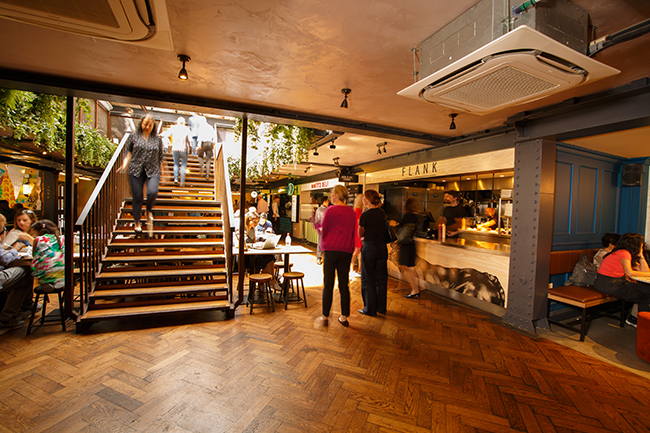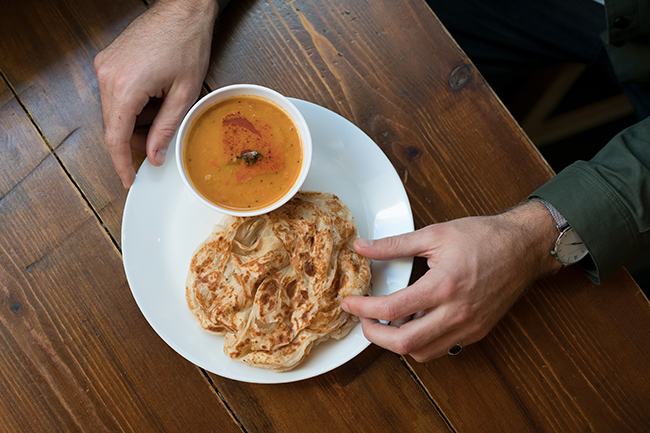Simon Anderson and Andy Lewis-Pratt on making Market Halls
Market Halls may as well have used the current issues facing the sector as a tick-sheet for the perfect operating conditions. Difficult rents, immobile councils, high business rates and financial barriers to entry all play to the groupâs strengths, allowing it to foster an emerging empire of food halls offering diners fast-casual food from 24 kitchens across sites in Fulham, Victoria and Essex, as well as an upcoming flagship in the West End.
Housing multiple high-quality, independent food stalls in a homogenous indoor space is a bold, simple idea that has been replicated around the world â" and the firmâs chief executive Andy Lewis-Pratt is amazed that the company could get in on the ground floor in the UK. âYou see food halls in Spain, you see them in Holland, you see them in Sweden,â he says. âAnd youâre left thinking â" whatâs London been doing?â
The climate propelling food halls in the city is the same disruptive force that led to the rise of east Londonâs surging food market scene when it emerged in the early years of the current decade. That was the start of some of the industryâs recent success stories, as traders built their brands in the markets and then moved into bricks and mortar. The wildly successful Taiwanese chain Bao, for example, has become a Soho staple and spread across the capital after developing on market stalls.
The missing link between al fresco markets and bricks and mortar restaurants was already brewing â" just not in Shoreditch. Food hall Time Out Market Lisbon was beginning to build up hype, while similar grand operations were emerging in New York. The idea of traders operating in indoor markets, possibly reminding UK diners too much of shopping centre food courts, was a short leap from outdoor markets but was simply not being picked up in London.
Lewis-Pratt, a former property, leisure and retail investor, was living in Portugal when he first saw Time Outâs offering in the nationâs capital. âI was genuinely surprised, because London normally leads,â he says. âThat was the catalyst, really.â
It wasnât long before Simon Anderson, the restaurateur behind Pitt Cue, had come on board as chief operating officer and co-founder. âItâs very rare to get a global phenomenon that isnât being either instigated from London or that London hasnât latched onto quite early,â he says. âSo from that point, we realised that there was a gap in the market.â
Space savers
Built into the heart of the business model is the use of run-down property; âunused and unlovedâ sites that can be renovated in-keeping with the brand. In Fulham, the site was once an underground station, while Market Hall Victoria previously housed the nightclub Pacha. The duoâs upcoming project in the West End is a prime example: a building Simon describes as a âconcrete edificeâ â" the former site of the redundant national institution British Home Stores (BHS). âItâs been empty for three years,â he adds, jibing: âIf you like modern, mid-century architecture, itâs a gem.â

He adds: âItâs about taking spaces that traditionally are hard to fill or have been empty for a while. Fulham was empty for six years. This [Victoria] was empty for four years. BHS has probably been empty for four or five years now.â
It is also a stance on site acquisition that has made licencing a breeze for the duo. Lewis-Prattâs time in property has seen him square up with plenty of councils over plans, but Market Halls was enough to melt the hearts of even the notoriously difficult Westminster Council.
âThe West End site is in the ward controlled by the leader of the council of City of Westminster,â he explains. âWe met and she said, âOh, I get it. Itâs like that Hudson Eats place in New York â" I canât believe I havenât got one in my cityâ. All she was concerned about was her borough getting one first.â
Skin in the game
Filling the halls with vendors has never been a challenge â" they received 200 applications on announcing the concept and now receive around three a day. Instead, it is about finding the right tenants to operate under the Market Halls umbrella.
With the potential for low-risk, high-reward operations, there are still plenty of operators looking for a slice of the action, from people taking their first steps into hospitality to chain operators. Even big businesses have vied for a seat at the table, proposing to change their offering to better fit the independent aesthetic. The answer is a swift no.
Most of Market Hallsâ revenues are picked up from food sales. For every pound of business, the firm takes a 25p cut on a weekly basis â" and, in return, the operator has their rent covered, along with costs associated with front of house and cleaning staff, marketing and bar operation, all managed in-house.
âWe want to create an environment in which a restaurant can trade and flourish without having to have the headaches of rent, rates and overheads that could cripple their businesses,â explains Anderson. âThe average investment to start trading with us is £5,000 to £10,000, and weâve got traders turning over more than a million quid a year.â
The set-up prompts a freer flow of conversation and fosters a more open relationship between landlord and tenant. Each Market Hall is an ecosystem unto itself, and both landlord and vendor alike are all dependent on one another. As Anderson puts it, they have âskin in the gameâ. âWeâre not just sitting back, taking the rent â" but if youâve got a traditional restaurant, the landlordâs taking the money whatever you do. We want to work with them.â
The result is a fertile training ground for traders, a platform for up-and-coming businesses and an incredible source of consumer data for the operators. Anderson says: âIn the time that weâve done this, Iâve generated more knowledge about what consumers want than probably anyone else in the industry.â
With a diverse offering ranging from coffee to full main courses to ice-creams, the art in curating the Market Halls offering has come down to creating a microcosm in which all traders can thrive. Lewis-Pratt adds: âWe could have other traders who probably take more money, but it would make the place a bit more bland. You need that variety and that choice.â
Defying blandness is key to the duoâs model. Market analysis carried out by the firm found that food was remarkably low among the priorities for its customers. The primary driver was location, followed by the siteâs atmosphere. Food came in third, while only 9% of customers cited specific traders as their reason for visiting. âItâs more about creating something thatâs big and fun in a place,â Anderson says.
A place to learn
Of course, not everyone can thrive in such a setting â" and traders have come and gone through the brandâs sites, but do so with diminished risk.
A big draw to the Victoria site has been Gopalâs Corner, an offshoot of London Eustonâs Roti King, which regularly boasts a long lunch queue as customers stare through the Perspex windows to watch their roti being freshly prepared. When the site launched, it was based next to Bunshop, a savoury bun concept created by chefs Jon Rotheram and Tom Harris of the Marksman in Hackney, which struggled to generate the same traffic. What it did pick up, however, was a trove of data on how its product works for customers.
The risk to the traders is also diminished by the lengths of the tenures. On average, stalls operate on six- or 12-month contracts, making it easy for operators to take in a captive audience, learn how their products resonate and take their next steps in hospitality â" be they within the Market Halls or outside of them. âTheyâre simple contracts; theyâre four pages long and written in English, not in legal speak,â says Lewis-Pratt. Anderson adds: âYouâre probably going to be trading with us for less than the legal fees to get a lease.â
Looking to the future
So far, itâs hard to see the firm as anything but an unmitigated success story. Sites are bombarded with customers during lunch and late service, and even nearby competitors have offered their thanks for driving up footfall in the area. But how does it grow from here? On an in-house scale, it comes down to everything the operators have been able to learn about their consumer base.
Anderson says: âBecause weâve got a lot of learning, weâre probably now more focused on what the customer wants than what the press wants us to have. So I think we will surprise some people with the line-ups that we have in some future sites. The marquee brands are amazing and get you the press, but they donât get you the sales.â
On a macro scale, growth means more Market Halls. The duo recently put their efforts into the Hall in the Intu Lakeside shopping centre in Essex. Itâs a different audience and approach to their other openings â" and, as such, it comes with different branding â" but the pair hope the site will be able to capitalise on the same independent spirit of its London sisters by bringing in traders from both the capital and small businesses with Essex roots.
Itâs also the clearest indication of how the groupâs learning will change their approach in the future. The site has been curated to directly challenge the nearby fast-food chains and casual dining offerings in the shopping centre, with high-quality alternatives that are âmore funâ. Thereâs Burger & Beyond, fried chicken from Mother Clucker, and Fundi Pizza from Essex brothers Charlie and Rory Nelson â" all looking to challenge the biggest names in fast food.
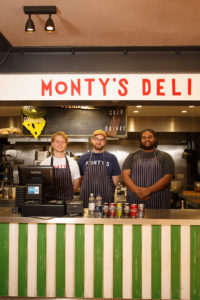
Anderson adds: âSometimes I watch people go around the hall, and I can see that theyâre overwhelmed. Itâs like the Netflix of food; people are thinking âwhat am I going to have?â in the same way they would think âwhat am I going to watch?â. And invariably people end up watching Friends. So if we can make sure that itâs the best episode of Friends, then thatâs when the customer feels happiest.â
Think big
The duoâs big ticket item, their West End opening, will be the largest food hall in the UK, covering 37,500 sq ft across three halls. For context, New Yorkâs Hudson Eats hall, one of the biggest in the US, is 30,000 sq ft, while Time Outâs Lisbon hall is 10,000 sq ft.
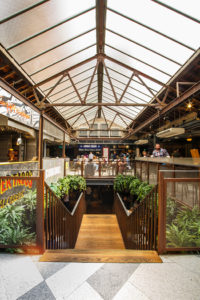
The site is expected to be able to seat some 800 covers, hopefully sidestepping a nice sort of problem that has developed in other locations â" too many people want to visit. Lewis-Pratt adds: âIf youâve been to Victoria in the evening, youâre threatened by people because theyâre looking for a space to sit. We donât want that and what weâve realised is people would rather have great food and somewhere to sit than have more choice for food but have nowhere to eat it.â
Expansion is continuing, with another new site in Canary Wharf next year and then eyes on the heart of the City around the same time. Although London remains the focus for the next 18 months, the pair have other regions of the UK in the back of their minds. The core theme is finding places with a density of workers to pick up on office footfall, with the firm utilising a tool that tests how well their business would play in any given location. Anderson notes: âYou could open a few in the city and not have any crossover.â
For all the challenges facing the industry â" rents and rates, difficult councils and heated competition to name just a few, Market Halls appears to have an answer: âWe kind of live in a gig economy,â says Anderson. âWell, weâre a gig economy restaurant.â
Market Halls in detail
Market Hall Fulham 472 Fulham Road, London SW6 1BY www.markethalls.co.uk/market/fulham Opened May 2018
Covers 250
Vendors Seven, plus two bars and a coffee shop
Market Hall Victoria 191 Victoria Street, London SW1E 5NE www.markethalls.co.uk/market/victoria Opened November 2018
Covers 400
Vendors 11, plus three bars and a coffee shop
The Hall, Intu Lakeside 601 The Quay, Lakeside Shopping Centre, West Thurrock, Grays RM20 2AD www.eatthehall.com Opened July 2019
Covers 680
Vendors Six, plus two bars and a coffee shop
Market Hall West End 9 Holles Street, London W1G 0BN www.markethalls.co.uk/market/west-end Opening Summer 2019
Covers 800
Vendors 12, plus four bars
On the menu
Market Hall Fulham Fannyâs Kebabs ⢠Vegan falafel, hummus and peppers, served in a wrapped kebab, with rice or salad £8.50 ⢠Persian fries: skinny fries tossed in sumac, zaâatar and ras el hanout £3
Hot Box ⢠Bandit burger: 28-day-aged beef patty with American cheese, smoked brisket, grilled jalapeño and chimichurri £12 ⢠Smoked selection: pork rib, beef brisket, sliced hotlink sausage, jalapeño chicken thigh, barbecue sauce and pickle slaw £16
Market Hall Victoria Gopalâs Corner ⢠Roti canai: two pieces of roti, served with dhal £6.95
â¢Â Mamak mee goreng: fried noodles, tofu and prawns in a chilli-based peanut sauce £8.95
â¢Â Reuben special: house-cured salt beef and pastrami, sauerkraut, Swiss cheese, Russian dressing and house mustard on toasted light rye, with a dill pickle £13
â¢Â Hand-rolled bagel with smoked salmon, cream cheese, tomato, red onion and capers £7



